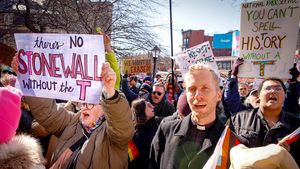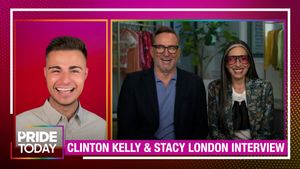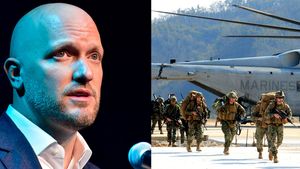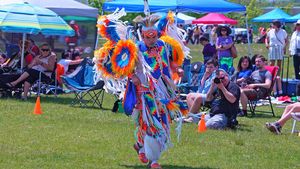If you're reading Out but not Wayne Koestenbaum, you're doing it all wrong. The queer-tastic essayist, poet, cultural critic, CUNY professor (and 2011 Out100 honoree) just released a collection of essays titled My 1980s & Other Essays, which means it's the perfect time to start digging into his spot-on writing (or continue reading if you're already a fan).
I first discovered him when assigned "My 1980s" as a reading assignment in a college English class, and what a great jumping-off point. The essay isn't any attempt at a comprehensive look at the '80s--it's a raw look at what the decade meant to one gay man living in New York at the time. While Koestenbaum's experiences aren't going to line up perfectly with everyone, the aura of "AIDS and cocaine" is tangible--and wholly believable.
I sat down with Koestenbaum to talk about the release of this new book. Although I was born in the 1990s, we compared the '80s to now, spending our time discussing AIDS, gaydar, and UPS men. We also compared outfits--quite the jolly gay time.
Here are 10 snippets and words of wisdom from our freewheeling conversation:
...On choosing the title essay of his book
I chose it to be the title essay because it's the most personal, and it sets up the whole book as an intellectual autobiography. It's not that personal; it's about music I was listening to--not about my love life or my family. I don't even talk about my body very much, which I love to do in other essays. In a way, I was announcing this would be a collection about culture I discovered in the '80s.
...On "self-ethnography"and what "queer" means
Ethnography means deciding that yourself is not a simple matter, but that it might take a few thousand pages to explain who you are and it may take decades to explain who you are. The queer thing about that is that if you take your sexuality as not a certainty but as a riddle, as something that needs to be negotiated, invented, put together from scraps--that's what "queer" means to me, a sexuality that needs to be invented and explained.
...On HIV ca. '80s vs. HIV now
What's fascinating about the changes in the climate around HIV, is that it's certainly what I took to be emotional and practical givens, what it meant to be a sexual being alive changed. In front of such differences, one stands like you do before the Grand Canyon or Niagara Falls, almost like a wonder of the world. The atmosphere around AIDS that I encountered in the '80s isn't the same--it's just a breathtaking fact.
...On those individuals lost in the '80s
It's almost like after World War I or something, a generation is kind of lost and it changes the ecosystem around the generation that grows up in the absence of this whole generation that is missing. So that is what I'm more aware of: the sense that it's almost like there are no parents around.
...On the "Men Who Want AIDS" story in Out magazine
There's a way in which this has been literalized, that there is no "outside" of the virus. As opposed to in the '80s when there were those who were infected and those who were not, there is now an increasing, seemingly volitional crossover into the kingdom of the sick that's no longer the kingdom of the sick, but actually a functional place to live. And, you know, obviously with barebacking culture, etc., there's a lot of deliberate and inadvertent rethinking about what sickness and health is.
...On "The hotness of the grandfather"
What I'm saying about the '80s and the difference at the Stonewall Inn is that they were hot, too. It's acknowledging the hotness of the grandfather, the grandfather was once a hot 20-year-old, at the core of all of this.
...On Grindr
I like Grindr. I actually don't use it myself, but friends of mine indulge me when we're out. I'm interested in the moment where the desire from the exchange, the "high" engendered by the experience from the technology, is severed from the supposed real thrill of sex.
...On his clothing color preferences
I think magenta and lime have a definite friendship. I think all bold colors look good together. I'm always [color blocking]. Look, would you say my sweater is magenta? It's fuchsia. The shorts are turquoise?
...On straight men who "experiment"
Three cheers for straight men who experiment. They are lifesavers. They really make my day. I love it. I wish there was a whole site just for them.
...On hot UPS men
The UPS men have always been cute. It's a talent pool--this is a known fact that they're really amazing looking and this guy [in the book] was astonishing.That was a happy day when the packages arrived. I don't know, I think they've gone downhill. Let's just say, "Dear reader, 1988 was the golden age of the UPS man."
My 1980s and Other Essays is available now.








































































